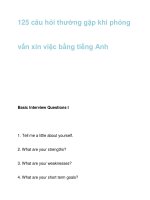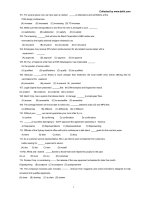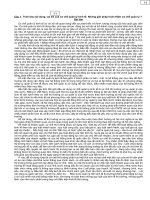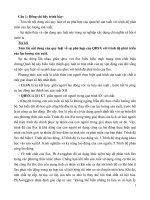Tổng hợp câu hỏi thường gặp luyện thi TOEIC
Bạn đang xem bản rút gọn của tài liệu. Xem và tải ngay bản đầy đủ của tài liệu tại đây (16.18 MB, 41 trang )
Part
Name
1. What's your full name?
2. How should I call you?
3. Who gave you your name?
4. What does it mean?
l Questions
Accommodation
1.
Do you live in a house or flat?
2.
Do you like it? Does your family like it?
3.
How would you change your apartment or house?
4.
How long have you lived there?
5.
Do you live with your family?
6.
ls the transport around your home convenient?
7.
What's your neighborhood like?
8.
What's your favorite room?
9.
ls there anything you want to change about this room?
10. Do you want to move?
11. What kind of place did you live in when you were little?
12. What kind of apartments or houses dd you want to live in the future?
13. Do you want to live on the countryside?
'14. Do you spend more or less time with your family than before?
15. Why do you come to this city?
16. Where do you live?
17. What's the traffic like?
1B. Willyou always Iive there?
19. What can you see from the window?
Hometown
1.
Where's your hometown?
2.
Do you like it?
3.
ls it a good place for children?
4.
Good and bad points of it?
5.
Are there any changes in your hometown in recent years?
6.
Will you work in your hometown in the future?
7.
ls transportation convenient in your hometown?
8.
Will you find a boyfriend/girlfriend in your hometown?
9.
Why do young people like to go to big cities?
10. What problems do big cities have besides bad traffic?
11. What do people take with them when they go out in big cities besides umbrellas?
12. What kind of customs do you have inyour hometown?
t
Occupation
1.
Do you work or study?
2.
What work do you do?
3.
What specific things do you do on your job?
4.
Why did you choose that job?
5.
What do you like most about your job?
6.
Would you recommend that job to others?
7.
What did you do on the first day of your job?
8.
Do you think this job has a bright future?
9.
What are the most interesting and the difficult part of your job?
10. Willyou change job in the future?
1 1
. Have you changed your job before?
'12. What's the most interesting thing in y6ur work?
13. How do you communicate with others during work?
14. ls it important to have breaks during work?
15. Do you prefer working alone or with a group of p6ople?
'16. What's your major?
17. Do you like it?
18. Will you change it if you have the chance?
19. Which majorwillyou change itto?
20. ls it different from what you had in mind?
21. Why did you choose that major?
22. Whal kind of courses do you need to study?
23. ls it hard?
24. ls it i'nteresting?
25. How can you learn it well?
26. Where do you study?
27. Vtlhy did you choose that school?
28. How often do you go home?
29. How Iong have you been studying in that school?
30. Do you like it there?
31" What do you plan to do after you finish your study?
32. Why do you choose to go abroad?
33. Which job do you want to do in the future?
34. Do you prefer studying in the morning or in the afternoon?
35. Who do you think are better at learning, older student or younger student?
36. What's your favorite subject? What do you like to study most?
37. What's the most difficult thing for you during your study?
38. Which subject will be most useful in the future?
39. Will you stay in touch with your classlnates in the future?
40. Who are more important to your study, the teachers or the students?
41. what are the differences between a science student and an art student?
42. Do you prefer studying by yourself or with a group?
43. When do you usually study?
44. What do you enjoy during your study?
.,
t
Farniny
1.
Who are you like the most in your family?
2.
3.
What do you usually do at home?
4.
5.
6.
How often do you stay with your family?
What do you usually do with your family at home?
Do Chinese people usually stay with their family?
ls family important in Chinese culture?
Visit*r
1.
Do you welcome guests in your home?
2. Do you have a lot of visitors in your home?
3. Do you like to visit other's home?
4. What do visitors usually do in your home?
5. Do you prefer visiting others orlnviting them over to your home?
6. Do Chinese people usually have dinner parties at their home or outside?
7 . Do you usually hang out with your friends at home or outside? What do you usually do?
,t
,rq
CeE*hrity
1.
Who are some of the famous people you like?
2.
Do you like to be famous?
3.
What are the disadvantages of being famous?
4.
Have you seen a celebrity in person?
5.
Have you read about anything about this celerity?
6.
Do you follow the news of those celebrities?
7.
Do you know any celebrities from your hometown?
[3ag
1.
Do you usually carry a bag?
2.
What do you usually put in your bag?
3.
Do you have different bags for different occasions?
4.
What do you consider when you buy a bag?
5.
Have you ever lost your bag?
6.
Will you carry different bags to match your clothes?
.e
"
i-{ulidays
1.
Do you like holidays?
2.
Do you prefer holidays from school or from work?
3.
How long do you need?
4.
Do you think a one-day holiday is long enough?
5.
What's your favorite holiday?
6"
What do you usually do on holidays?
7.
Do you think students need more holidays?
8.
Do you prefer staying at home or going out during holidays?
9.
What's the most important holiday in China?
"
1.
C*lelr
1.
What's your favorite color?
2.
3.
4.
lmportance of color in your childhood?
5.
Which color will you and will you not use in your roo.m?
6.
Will you buy something in a color that you don't like?
ls color important to you?
Do you prefer dark colors or light colors?
,I
'f
Ch*c*lat*
1.
Do you like chocolates?
2.
How often do you eat them?
3.
Do kids like to eat chocolate?
4.
Did you like to eat chocolate when you were little?
5.
Did you parents allow you to eat chocolate when you were little?
6.
Do Chinese people like eating chocolates?
7.
Do they make good gift?
8.
Why is chocolate so popular in so many different places?
L
When did you first eat chocolate?
,aa
ti
-
Place near wat*r
1.
Do you like ride boats?
2.
Do you like swimming?
3.
Do you know how to swim?
4.
ls it important to learn swimming?
5.
ls it important for kids to learn swimming?
6.
What do you usually do when yoLl go to a place near water?
7.
Have you ever travelled by ship?
t8
I
ti
S*ok
1.
Do you like reading books?
2.
What kind of books do you usually read?
3.
Have you read any book recently?
4.
Do you prefer buying your own book or borrowing one?
5.
Have you read a book for morethan once?
6.
Do you like e-books?
'i
:..
I L"dUT }gI
1.
Who's your favorlte teacher?
2.
What makes a teacher popular?
3.
Do you like to be a teacher?
4.
Have you ever taught anybody?
:
i"ianetwritir:g
1.
Do you usually handwrite?
2" When do you have to handwrite?
3.
Do you prefer handwriting or typing?
4.
What's the difference between handwriting and typing when you write to others?
5.
Do you think handwriting will be replaced by computers?
6.
ls it still necessary to keep handwriting?
7,
What impression does a person's handwriting have on other people?
,t'l
Ftrot*s
1.
Do you like to take pictures?
2.
When do you usually take pictures?
3.
Do you like to take pictures with your family?
4.
Do you like to take pictures of yourself?
5.
How often do you take pictures?
6.
How to improve your photography skills?
7.
Do you have a lot of pictures taken when you were little?
8.
Do you like to take pictures when you are travelling?
9.
Do you prefer taking pictures or recoding videos?
ti
i,l . -il
1a r,'rJ ir
i ir1.f.t
Ar: urr***al i:nd i:ltere*ting thlrlg
y*y cli* r*e*rrt8y
.t
Describe an unusual and interestinE thing yor-r
recently
You shoutd say
.
.
'
What it was
Who you did
with
Why you did
and explain why
was unusual arrd interesting
Part 3
1.
2.
3.
4.
5.
6.
7.
What kind of outdoor activities do people usually do?
ls it important for parents to be with their kids when their kids are
What different activities do men and women like to do?
"ngrginf
Do you like watching comedies?
Which generation of people do you think have the longest free time?
Who usually have more free time, men or women?
What do kids usually do when they are free?
?3
in activities?
A time when you were busy
Describe a time when you were busy
You should say
..
.
.
When it was
What you had to do
How you got over it
and explain how you felt about it
Part 3
1. Are kids in different countries under the same amount of pressure?
2. how can people keep fit if they don't have time to exercise?
3. Should young children spend more time on study or playing?
4. How long should the holiday be for children?
5. Should children be too busy?
6. How to encourage employees to work extra time?
7. What can kids learn from playing?
B. Do they learn more from playing or from classes?
A time when you were preparing far a happy event
Describe a time when you were preparing
event
You should say
.
.
.
When it was
Who helped you
How you made it
and explain why it was an happy event
irPilr;it::l::l:i::t:::=i,,' r';:ii$rllii*)li lr'':-::::::rr1|-5,Y
Part 3
1.
2.
3.
4.
5.
6.
7.
Do you think a person's organizational skills are born or learnt?
Why are some people better at organizing things than the others?
What kind of things do people usually have to prepare for, besides exams and holidays?
Do you think preparation is important?
How to prepare well?
How do people prepare for the work next day?
How can parents teach their children about how to prepare for things?
25
.-,
I
f
.r,
r'.i ''
A tim* when you wer* in clcse cor:tact witl-r a wild anixal
Describe a time when you were in close contact with a
wild animal
You sl-rould say
,
.
.
When and where it was
Which animal you saw
What the animal did
and explain how you felt about it
Part 3
1.
2.
3.
4.
5.
6.
7.
8.
9.
Do people usually go to zoos in China?
Why do kids love wild animals?
Why do teachers always take kids to the zoo?
ls it good for kids to see so many animals locked up in cages when they go to the zoo?
Why do more and more people like to keep pets?
What can kids learn from keeping a pet?
What is the purpose of a zoo?
Are animals at the zoo treated nicely?
Can you see every animal in the zoo?
10. Should animals be kept in the zoo?
11. Which is better for kids, watching animals in the zoo or on TV?
12. Do you like those clothes made of animal furs?
,)a
-,
I
A tirne when y*u rnissed an imp*rtant appcintn':e*t
Describe a time when yoLr missed
app0intment
\lou shoutd say
'
'
.
When and where it Was
How you missed it
What the corrsequence was
and explain how you felt about it
Part 3
1.
2.
3.
4.
5.
6.
7.
8.
L
Do you have a habit of recording the family history? Why?
How do you keep it?
How to people remember their appointments?
What will happen when you forget an appointment with your boss?
ls it ok to be late for just 10 minutes?
Can technology help us remember things?
Why do people like to know about their family history?
ls it necessary for people to remember those who have made contributions to the nation?
How should people teach children about their family business?
10. Which is worse, missing an appointment about your work or missing an appointment with your
friends?
1'1
. ls it possible that some people forget those appointments on purpose?
12. What can you benefit from having an appointment with your friends or colleagues?
-f
r{ tinre when you used
y*ur imaginaiion
Describe a time when you used your imagination
You shoutd say
..
'
.
When and where it was
What you did
H0w you were being imaginative
and explain how you felt about it
!
!!Lll\i\)l,lii.r:ii:,ri::::i;::i:n
.-:::r=ri:l:r::r!rr
I
I'l::::::::r::::=
Part 3
1. ls it necessary for children to develop their imagination?
2. ls it important for teachers to encourage children's imagination?
3. Why do people think that imagination is important for children?
4. Are stories and cartoons good for children's imagination? Which one works better?
5. ls playing video games good for children's imagination?
6" What kind of jobs require imagination?
7 Do businessmen or scientists need imagination?
8. Can adults have a lot of imagination?
9. ls imagination essential for scientist?
10. How to develop imagination?
'1
1. Do you think imagination can be developed?
'f_
.a \:_'
.,
I
& prrs*ir
y** n:*t re(sntiy
*r1*
w,a{:tl
t$ knew mx}rs iabr:,rit
Describe a person you met recently and want to know
rnore about
You should say
.
.
'
Who this person
is
Wlren you met this persofr for the first tirne
What this person is like
explain why you want to know more aboLrt this person
Part 3
1.
2.
3.
4.
5.
6.
7.
What kind of people are good at making new friends?
Can you make true friends online?
How do you make new friends?
How to leave a good impression on new friends?
What qualities do you think are important when you are making new friends?
What are the differences between friends at work and friends outside work?
YVould you like to organize activities in the office? Will your colleagues enjoy it?
B. How would you make friends if you go to a strange country?
9. ls it important for friends to share a common hobby?
10. ls it important to be polite when you meet someone for the first time?
't
',1
I
.
L
)
.:;'j
rlll
E'
@
E9
A tri*yel*/nr*t*rbil**icar trip you wqrlxi l,hs to t*k*
Describe a bicycle/motorbike/car trip yolr would like
take
You should say
.
.
.
Where you want to go
Who you want to go withr
Why you want to go
And explain whether it will tre difficLrlt or not
Part 3
1.
2.
3.
4.
5.
6.
Which is more popular in China? Bicycle or car?
What do you think of the transportation system in your hometown?
Why do people take cars or the subway?
What is the main type of transportation in China?
How to people go to those places that can't be reached by bus or subway?
Why do people buy cars?
7. lffhat
different tran_sportations do people use in the city and in the countryside?
-lr









